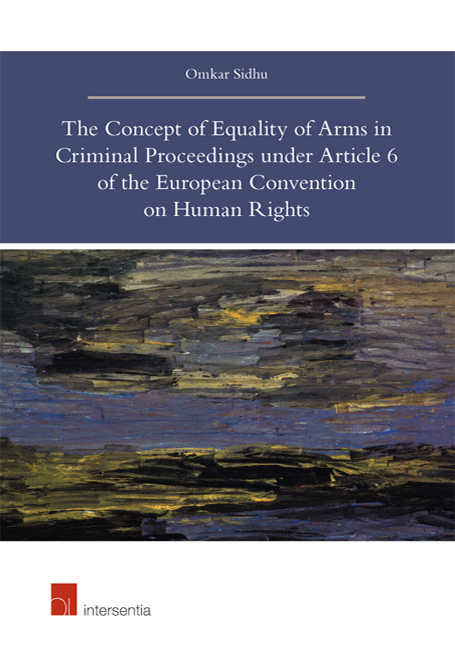Book contents
- Frontmatter
- Contents
- Introduction
- Chapter 1 A Background for Article 6
- Chapter 2 Equality of Arms
- Chapter 3 Equality of Arms and the Right to Challenge and Call Witness Evidence
- Chapter 4 Equality of Arms and the Right to Adequate Time and Facilities
- Chapter 5 Equality of Arms and the Right to Legal Assistance
- Concluding Overview
- Bibliography
- List of Cases
- List of Legislative Instruments
- Frontmatter
- Contents
- Introduction
- Chapter 1 A Background for Article 6
- Chapter 2 Equality of Arms
- Chapter 3 Equality of Arms and the Right to Challenge and Call Witness Evidence
- Chapter 4 Equality of Arms and the Right to Adequate Time and Facilities
- Chapter 5 Equality of Arms and the Right to Legal Assistance
- Concluding Overview
- Bibliography
- List of Cases
- List of Legislative Instruments
Summary
States parties to the Convention recognise in their criminal justice systems that the control of crime is not an objective that should be pursued in disregard of the interests of accused persons. Th is recognition is manifested in their accepted obligation, which also reflects a commitment to the rule of law, to secure to everyone within their jurisdiction the right to a fair trial in Article 6.
The content of the right is a product of a gradual historical evolution in Western standards of procedural fairness. This evolution began with developments in trial rights in national laws designed to secure correct trial outcomes. Article 6 has benefited from the lessons gleaned from both progressive and regressive developments at national level. Its content was also influenced by procedural rights entrenched in instruments of constitutional significance, for procedural fairness evolved to become a contributor to securing some form of good governance. It was the emergence of a shared respect for the dignity of the individual in the aftermath of the Second World War that procedural fairness became an interest to be protected in international law, the fair trial provisions in the UDHR and in early draft s of the ICCPR becoming influential precursors to Article 6. The emergence and recurrence through different stages of Western procedural history of certain trial safeguards, in various formulations, which present some resemblance to those included in Article 6, demonstrates that attempts have always been made, to varying degrees, to lessen the extent to which accused persons suffer procedural disadvantage vis-a-vis the prosecution or accuser.
Article 6 does not exhaustively define the concept of a fair trial. It merely requires that the accused have adequate opportunity to exercise certain minimum procedural rights. These rights consist of those that are express and implied in the article. The concept of equality of arms has a legal basis as an implied element of the Article 6(1) fair hearing guarantee. Indeed, it is also a well-established aspect of a fair trial in international law.
The value of equality of arms derives principally from its instrumental and intrinsic values. It is instrumental to rendering more probable a correct trial outcome.
- Type
- Chapter
- Information
- The Concept of Equality of Arms in Criminal Proceedings under Article 6 of the European Convention on Human Rights , pp. 239 - 242Publisher: IntersentiaPrint publication year: 2017

